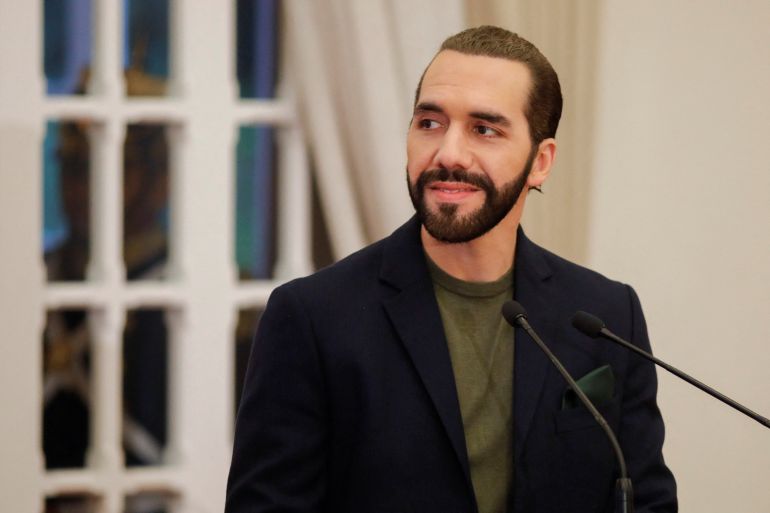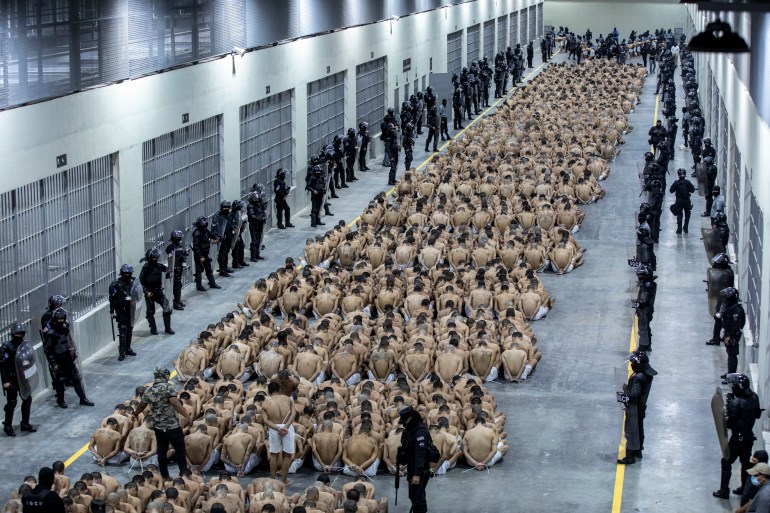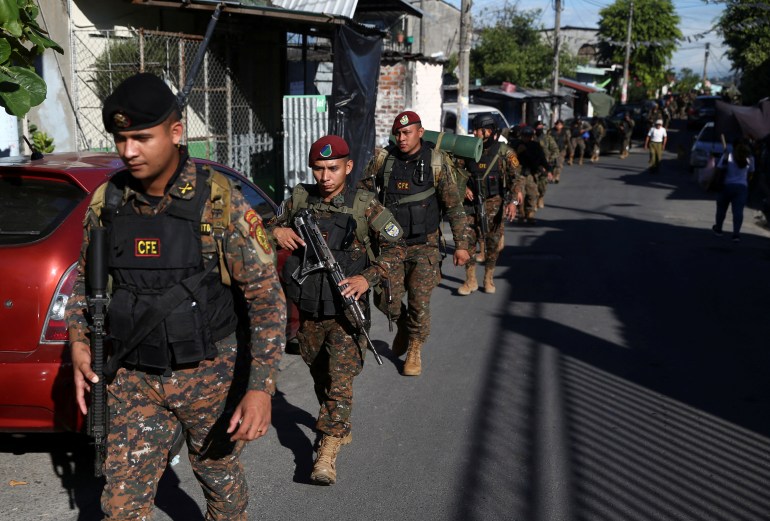Could El Salvador’s gang crackdown spread across Latin America?
A harsh crackdown on gangs has brought Salvadoran President Nayib Bukele popularity, but experts say the cost is steep.

For more than a year, Latin American countries have watched as El Salvador swept more than 70,000 people into its prison system, with little semblance of due process, in a bid to eliminate the criminal gangs that have plagued the country for years. And many seem to like what they see.
Despite the suspension of civil liberties and allegations of abuse in El Salvador, politicians in neighbouring countries like Honduras and Guatemala have praised President Nayib Bukele as a model worth emulating.
Keep reading
list of 3 itemsEl Salvador committing ‘systematic’ abuses in gang purge: Amnesty
Bukele’s re-election bid fuels new concern in El Salvador
That admiration is not confined to one end of the political spectrum. In Honduras, left-wing President Xiomara Castro announced her own crackdown on gangs that drew comparisons to El Salvador’s. And in Guatemala, former right-wing presidential contender Zury Rios called El Salvador a “model for reference”.
But while some in Latin America view Bukele in a positive light, others question if his policies can be replicated without eroding democratic safeguards and causing further violence. Since 2022, El Salvador has been under a state of exception, limiting constitutional rights in order to take swift action against alleged crime.
“When massive rights violations become commonplace, it’s very rare for this to result in lasting peace,” said Noah Bullock, executive director of the Salvadoran rights group Cristosal, which has monitored rights violations under the state of exception.
“It generates a very clear message that anyone can be detained at any time. It makes people think twice before voicing criticism of the government.”
A blow to criminal gangs
But those threats to civil liberties have not dimmed Salvadoran support for Bukele.
While Bullock has said the situation is more nuanced than the triumphal narrative promoted by the media-savvy administration, the president consistently polls as one of the most popular leaders in the world.
Support for the crackdown is also notable. A June poll by the Salvadoran think tank FUNDAUNGO found that 53 percent of respondents had positive views of the state of exception. Only about 9 percent called it negative.
When asked what they considered the greatest achievement of the Bukele administration, the survey participants ranked crime reduction first, with 40 percent of respondents choosing that option. In second place was the state of exception itself, at 27.5 percent.
That popularity, even amid mounting evidence of false imprisonment and torture, stems partly from the fact that the campaign has produced tangible results.

In January, the government said El Salvador’s homicide rate had decreased by nearly 57 percent in 2022, and critics acknowledge that gangs that once brought violence and extortion to entire neighbourhoods have been dealt a significant blow.
“The magnitude of the gang problem was a serious security challenge for many people, it’s true,” said Jose Miguel Cruz, a professor at Florida International University who researches criminal gangs, violence and policing in Latin America.
“In some neighbourhoods, they [the gangs] were the ones who ruled. Now you don’t have to deal with that, and people are understandably reacting positively to this.”
‘Huge political dividends’
Experts have said other Central American countries grappling with violent crime and gang extortion are now looking to El Salvador’s success with envy.
“These policies are popular, and leaders in Latin America know this,” Gema Kloppe-Santamaria, a historian and sociologist who researches crime and violence in Latin America, told Al Jazeera.
She pointed to Honduras’s left-wing President Castro, who campaigned on a platform of demilitarising the country’s security system and has since done an about-face, implementing a Salvadoran-style state of emergency to combat crime, albeit on a more limited scale.
Kloppe-Santamaria said the popularity of leaders like Bukele may have helped prompt that reversal. “This is why you see Xiomara Castro is now going against everything that she promised during the campaign, because she’s realising that this has huge political dividends.”
But while heavy-handed security tactics may alleviate anxiety about crime, experts warned that the public has a tendency to shift its concerns elsewhere.
Since December 2021, the number of Salvadorans who cited security as their greatest concern has plummeted, according to the June poll from FUNDAUNGO. But the number who pointed to economic issues has more than doubled to 68 percent.
Respondents in the same poll identified Bukele’s efforts to promote cryptocurrency as his greatest policy failure.
Experts also noted that “mano dura” or “hard hand” policies that rely on militarised policing have been consistently used in countries from Mexico to Brazil for decades, often unleashing periods of heightened violence and rights abuses. Rather than representing a new approach, Kloppe-Santamaria said, “mano dura” is nothing new in Central America.
“The three countries of the so-called northern triangle [Guatemala, Honduras and El Salvador] implemented these types of measures in the early 2000s,” she explained, although she noted that earlier attempts were not on the same scale as the current state of exception.
“So Bukele is trying to sell this as a new recipe, as something that he’s the first with the courage and virility to try. But that’s not accurate.”
Concentration of power
Rights groups have said that what also separates the current crackdown in El Salvador from previous efforts is the concentration of power in the hands of the president.
“At present, in El Salvador there is a lack of independence in both the legislative and judicial branches of the government, as they appear to be acting in total coordination and collusion with the executive,” Irene Cuellar, a researcher on Central America with Amnesty International, told Al Jazeera in an email.
“This has allowed the implementation of legal frameworks that contradict international human rights standards, particularly concerning criminal proceedings.”
The Bukele administration has also been accused of stifling dissent and targeting critical voices in order to operate without oversight.
In April, the Salvadoran investigative outlet El Faro alleged a campaign of government harassment had forced the publication to relocate its legal and administrative operations out of the country.
Several of its reporters even had their phones targeted with the notorious spyware Pegasus, which is available only to governments and has been used around the world to spy on activists, political rivals and journalists.
Cruz, the professor at Florida International University, is sceptical that the scale of Bukele’s state of exception is viable in neighbouring countries, where civil society groups and other branches of government have been able to maintain more independence.
“Countries like Honduras and Guatemala still have some institutions with enough independence to act as a check on that kind of executive power,” he said. “In order for this to work, you have to have something like a dictatorship.”

Dark history
The logic of the state of exception — that, to combat crime, it may be necessary to suspend democratic rights — is one with a disturbing history in the region.
During the Cold War, right-wing dictators and militaries in Central America — often propped up by the United States — killed, tortured and abducted hundreds of thousands of people deemed communist or subversive, including students, religious officials, Indigenous people and labour organisers.
“The rhetoric of anti-communism enabled political elites to bend the law, abuse human rights and go after political dissidents, no matter their involvement in guerrilla groups,” Kloppe-Santamaria said. “So I see a continuum, with criminals and drug traffickers taking the place of communists as a new enemy used to justify abuses of power.”
Bukele has sought to portray experts and human rights groups as out of touch, more concerned with the rights of alleged criminals than with those of everyday Salvadorans suffering under gang rule.
But for Cristosal director Bullock, there is nothing out of touch about defending rights such as due process protections.
He noted that public opinion polls showed strong disapproval for specific tactics that violated human rights. A March survey from the Salvadoran institute IUDOP, for example, found that nearly 74 percent of respondents disapproved of arrests without judicial orders, which are required when someone is not actively committing a crime.
And awareness appears to be growing about the innocent people believed to be caught up in El Salvador’s mass arrests. The same survey found 34 percent of respondents said they knew someone with no gang ties who had been detained, up from 16.5 percent in 2022.
“It’s pretty simple: Protections under the law are abstract until you don’t have them any more,” Bullock said. “Nobody is against the state dismantling organised crime. The question is why Bukele believes you have to dismantle democracy to do it.”